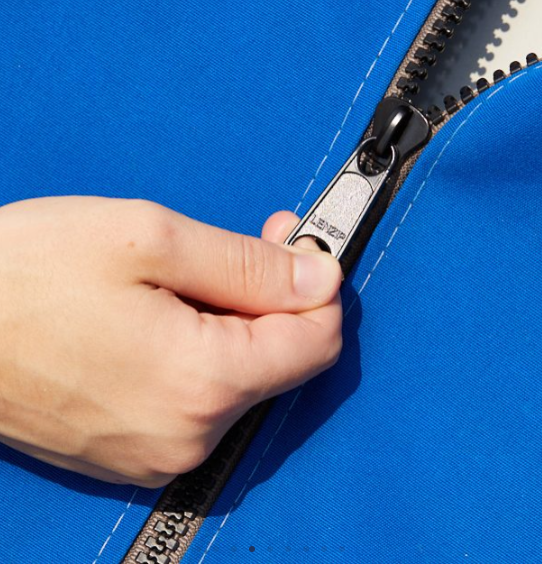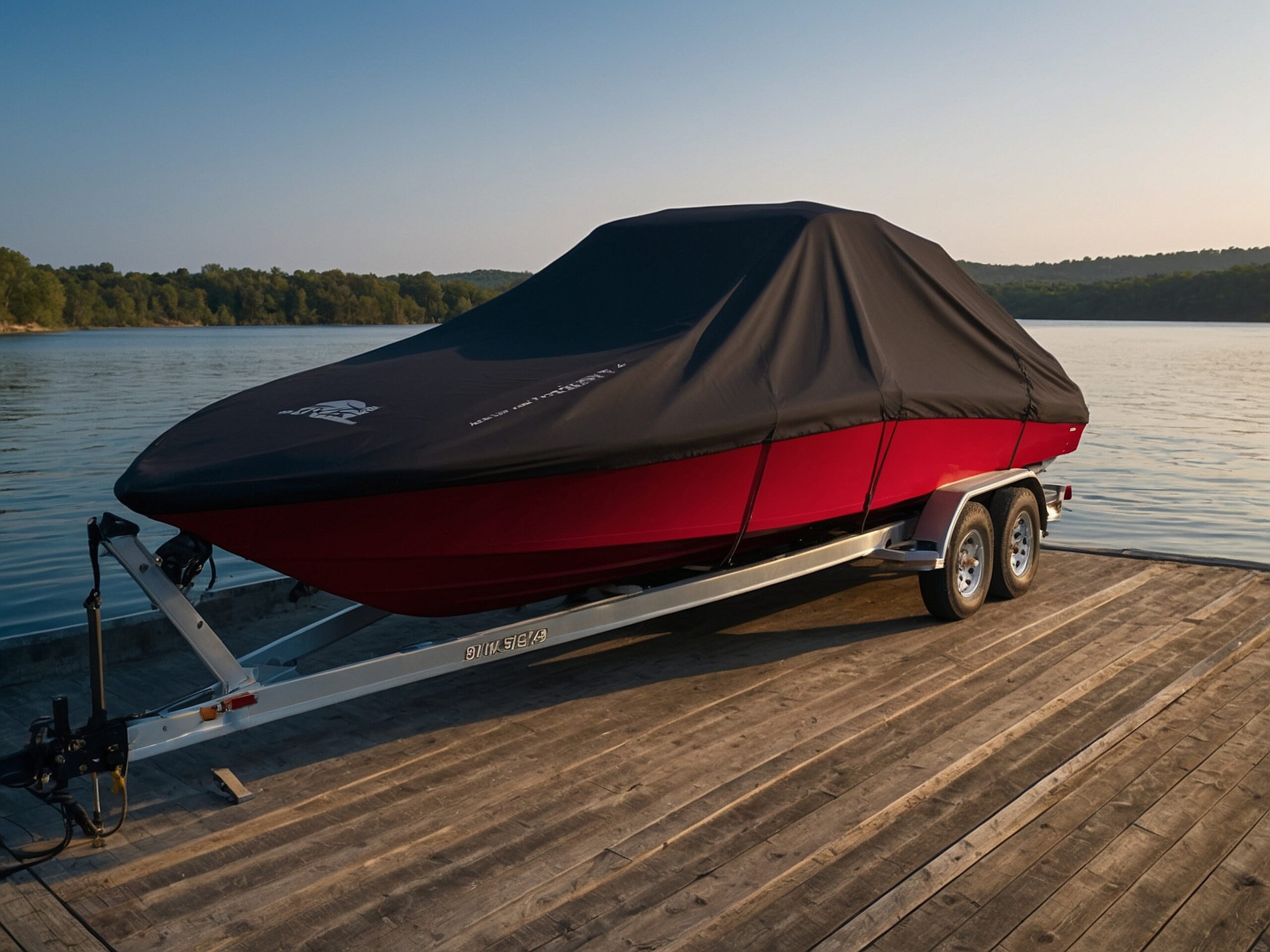If you manufacture boat covers, marine enclosures, or protective gear, you know this truth: your product is only as strong as its zippers. Even the highest-grade marine fabrics and stitching can’t perform if the zipper fails. A failed zipper leads to water intrusion, wind lift, and eventual product breakdown.
In marine environments, the zipper isn’t a small detail—it’s a critical structural component. Boat cover zippers experience continuous stress from UV radiation, salt exposure, temperature swings, and repetitive motion. When that closure gives out, the entire cover’s integrity is compromised.
That’s why leading OEMs and marine fabricators rely on LenZip, a U.S.-owned zipper manufacturer, to engineer zippers specifically designed for outdoor and marine abuse. With decades of testing and marine industry experience, LenZip’s corrosion-resistant, UV-protected, and water-resistant zippers are built to outlast the competition and protect valuable marine investments season after season.
Why Zippers Matter in Marine Applications
Every marine zipper must do far more than open and close—it has to defend against wind, saltwater, and solar damage 24/7. On a boat cover, that zipper functions like a pressure seam, enduring wind loads, fabric tension, and exposure to the elements that few other fasteners encounter.
When a boat cover zipper starts to jam or separate, it doesn’t just cause a small inconvenience. The failure creates open seams, water pooling, and uneven stress across the fabric. Over time, this leads to frayed edges, rusting hardware, and dissatisfied customers. The truth is that many “boat cover problems” actually start as zipper problems—poor material choice, under-gauged sliders, or low-cost coatings that break down prematurely.
In the marine industry, choosing a heavy-duty marine zipper isn’t optional. It’s an investment in the product’s overall lifespan and in the end user’s satisfaction. Each zipper should be rated not only for tensile strength but also for corrosion resistance, UV endurance, and fatigue cycles.
A boat cover can’t protect a vessel through a storm if the zipper can’t hold up to one.

Zipper Materials for Boat Covers
Zipper materials define both the performance and reliability of a marine closure. Each has unique advantages—and trade-offs—that determine how well a zipper will perform in outdoor conditions.
Molded Plastic Zippers
Molded plastic zippers are the backbone of modern marine zippers. Their teeth are injection-molded directly onto the tape, creating a rigid interlock that resists deformation under load. These zippers are made from polyacetal or polyester resins engineered to withstand UV degradation and saltwater corrosion.
Unlike metal, plastic zippers won’t oxidize or seize in high-humidity or salt-air conditions. That’s why they dominate in large cockpit covers, storage enclosures, and boat tops. Their rigid structure also makes them ideal for heavy-duty marine applications where closure integrity must remain constant under tension.
Nylon Coil Zippers
Nylon coil zippers are another industry staple, particularly valued for their flexibility. The continuous nylon filament that forms the coil provides exceptional bend tolerance—perfect for curved seams, flexible covers, or removable panels.
A properly treated UV-resistant nylon coil zipper maintains smooth operation even after hundreds of open-close cycles in bright sun and moisture. It’s especially useful for interior boat applications, canvas windows, and covers that must fold compactly.
For an in-depth look at how fiber type affects performance, fabricators can reference Nylon vs. Polypropylene for Marine and More, where LenZip explains tensile differences, flexibility profiles, and coating options for marine environments.
Metal Zippers
Metal zippers once led the marine market but have largely been replaced. Even with coatings, unsealed metal teeth and sliders eventually corrode in saltwater. LenZip still manufactures metal zippers for luggage or industrial cases, but for marine products, molded plastic or nylon coil are far more reliable.
The Role of Zipper Tape and Sliders
Zipper teeth get the spotlight, but tape and sliders do the heavy lifting. Zipper tape serves as the structural foundation, transferring tension evenly between the fabric and the teeth. The slider aligns and locks the teeth, allowing for smooth and consistent closure.
Modern marine-grade tape is typically polyester, chosen for strength, colorfastness, and minimal moisture absorption. Cotton tape, once common, breaks down quickly under UV and salt exposure, making it unsuitable for long-term marine use.
Sliders are just as crucial. In marine conditions, corrosion-resistant sliders—made of coated brass, nickel-free alloys, or polymer composites—are mandatory. Locking sliders add security for enclosures that face constant wind pressure.
At LenZip, engineers match every zipper’s tape and slider combination to its environmental requirements. Sliders are plated or coated to resist corrosion, while polyester tapes are UV-stabilized to withstand prolonged exposure. These zippers undergo ASTM and MIL-SPEC testing to confirm tensile strength, salt-spray resistance, and slider durability.
When all these factors align, the result is a boat cover zipper capable of performing for years with minimal maintenance.

Common Marine Zipper Failures
Even the strongest marine fabrics can be undermined by a weak zipper. Understanding failure points helps manufacturers design smarter and avoid warranty issues.
Most common causes include:
Corrosion of metal parts: Unprotected teeth or sliders quickly oxidize in salt environments.
UV degradation: Extended sun exposure weakens the polymer matrix of teeth and tape, leading to cracking and color fading.
Jamming from salt or debris: Fine sand and salt crystals clog sliders and cause grinding or locking.
Teeth separation: Using a zipper gauge too small for the load leads to misalignment and skipped teeth.
Tape wear and fraying: Excessive tension or untreated edges cause tape breakdown over time.
Each of these issues can be mitigated through the correct selection of corrosion-resistant zippers and UV-resistant coatings. Zippers that incorporate LenZip’s marine finishes are tested to perform under long-term salt exposure, maintaining functionality even after 1,000+ cycles of wet/dry fatigue testing.
For a detailed comparison between leading brands, the LenZip vs. YKK guide highlights measurable differences in tensile, fatigue, and corrosion performance.
Choosing the Right Marine Zipper
When it comes to boat cover zippers, there’s no one-size-fits-all solution. The right zipper depends on application demands, cover design, and environmental exposure.
For boat covers exposed to saltwater or tropical humidity, corrosion-resistant zippers are non-negotiable. They prevent lockups and tooth deterioration after repeated wet cycles. In high-UV regions, UV-resistant zippers with protective coatings preserve both strength and appearance.
Flexibility also matters. Nylon coil zippers offer the best performance for folding enclosures, while molded plastic zippers deliver superior load-bearing strength. The choice between the two often comes down to whether you need flexibility or rigidity.
As a trusted zipper manufacturer USA, LenZip provides total customization:
tape color, slider material, gauge size, and even pull design can be engineered for your specific marine use. That’s why OEMs and marine fabricators continue to partner with LenZip for their custom zippers USA requirements.
Custom Zippers & U.S. Manufacturing Excellence
Working with a U.S.-based zipper manufacturer provides advantages far beyond proximity. It ensures transparent sourcing, reliable supply chains, and unmatched engineering support.
LenZip has been producing custom zippers USA since 1946, serving industries from marine to protective gear. Every zipper is manufactured in-house—from coil winding to tooth molding and slider assembly—so quality remains consistent from start to finish.
Each zipper undergoes Zipper Testing Standards for tensile, fatigue, and corrosion performance. These tests simulate real-world marine abuse: salt fog exposure, UV light chambers, and repeated bending under tension.
In addition to testing, LenZip’s domestic operations allow for small-run prototyping, fast revisions, and exact material matches for OEM contracts. This agility gives marine canvas shops and cover manufacturers the flexibility to respond to custom orders without long offshore lead times.
Supporting American manufacturing also means supporting American jobs. Domestic production reduces transport emissions, keeps supply chains transparent, and guarantees compliance with environmental and labor standards.
As BoatUS notes, “High-quality components define the life of any marine product.” And Sailrite emphasizes that choosing the right zipper can double or triple the usable life of a boat cover.
LenZip’s dedication to U.S. innovation ensures that marine zippers meet the toughest standards of reliability, consistency, and design precision.
Marine Zipper Maintenance & Longevity Tips
Proper care is essential to preserving boat cover zippers and ensuring they perform season after season. Routine maintenance not only extends zipper life but also prevents premature wear from salt and UV exposure.
Follow these proven practices:
Rinse regularly: After saltwater use, rinse the zipper with fresh water to remove salt and sand particles.
Lubricate sliders: Apply a marine-grade lubricant periodically to reduce friction and prevent binding.
Avoid harsh cleaners: Chemicals can strip UV coatings and weaken fibers—use mild soap and water only.
Store covered: When possible, keep covers out of direct sunlight to limit UV degradation.
Inspect annually: Check for corrosion, stiffness, or missing teeth before reinstalling for the season.
Follow manufacturer instructions: Refer to LenZip’s Zipper Maintenance & Care guide for best practices.
These steps, combined with quality material selection, ensure your heavy-duty marine zippers continue to perform under even the toughest conditions.
Conclusion
Marine covers are exposed to an unforgiving mix of salt, UV rays, and motion. Each zipper must act as both a seal and a safeguard against those forces.
When you specify water-resistant zippers from LenZip, you’re choosing closures engineered from decades of marine testing, field experience, and American craftsmanship. Whether it’s a molded plastic zipper for a heavy enclosure or a flexible coil zipper for a curved seam, every product carries the same DNA—precision, performance, and durability.
The next time you design or source a boat cover, remember: the zipper isn’t just a fastener—it’s the anchor of the entire system. Choose one built to last, built in the U.S., and built by LenZip.
Ready to discover the next generation of marine zipper performance? Learn more.
FAQ Section
What type of zipper lasts longest in marine environments?
Heavy-duty molded plastic zippers with UV-resistant and corrosion-resistant coatings last the longest in marine settings, outperforming untreated metal or nylon designs. See Zipper Materials & Finishes.
Are plastic zippers water-resistant?
Yes. Molded plastic zippers are inherently water-resistant and ideal for marine applications. Learn more at Zipper Materials & Finishes.
How do UV rays affect zipper performance?
UV rays degrade untreated zipper tape and teeth, causing brittleness. LenZip’s Zipper Testing Standards ensure every marine zipper receives proper UV-resistant coatings.
How are marine zippers tested for corrosion and strength?
LenZip’s marine zippers undergo rigorous ASTM and MIL-SPEC tests that simulate real-world saltwater and UV conditions.
Why choose a U.S.-based zipper manufacturer like LenZip?
U.S. manufacturers like LenZip provide local engineering, rapid prototyping, and consistent quality assurance unmatched by imports.
